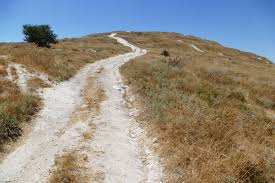 After the midway point of the Gospel of St. Mark, Jesus begins His final journey to Jerusalem. Everything that happens in the second half of the Gospel must be seen in light of that trip, not only to Jerusalem, but to Mt. Calvary and the Cross.
After the midway point of the Gospel of St. Mark, Jesus begins His final journey to Jerusalem. Everything that happens in the second half of the Gospel must be seen in light of that trip, not only to Jerusalem, but to Mt. Calvary and the Cross.
In chapter 9 (v. 30) of the Gospel, we find this expression: “Jesus and His disciples left from there and began a journey through Galilee, but He did not wish anyone to know about it.” There is a complimentary verse in chapter 8 (vv. 29-30): “Peter said to Jesus in reply, ‘You are the Christ.’ Then Jesus warned them not to tell anyone about Him.” Also in chapter 8 (v. 26), Jesus tells a man who had just been healed: “Do not even go into the village.” No doubt, our 21st century eyes and ears wonder “why all the secrecy?”
As has been true through the centuries, our modern response to all of this is: “Aren’t we called to be witnesses to Christ every day? Aren’t we supposed to be an Evangelizing people, spreading the Good News? So, why would Jesus be telling people who know Him and who have been healed by Him to keep everything a secret?” From the beginning of Biblical scholarship, we have called this the “Messianic Secret.”
What might help us understand this “secret?” St. Mark wrote his Gospel within a generation of the dying and rising of Jesus and he wrote it to Christians under persecution in Rome. However, at the same time, he is (presently) writing to each of us. He is reminding us, through Jesus’ words, that the Cross is the focus of our faith. We find this pointed out by St. Paul who wrote to the Corinthians “We preach Christ crucified, to Jews a stumbling block and to Gentiles foolishness” (1 Corinthians 1, 23). The willing embrace of His Passion and the self-sacrifice of Jesus on the Cross will not come to pass until the final chapters of the Gospel. So, to reveal who He really is and what He has come to do any earlier in the Gospel would lead to serious misunderstanding.
The “Passion narrative” (the Last Supper, Gethsemane, the betrayal, and Mt. Calvary) is the high point and the cornerstone of the Gospel. It will not be until chapter 14, however, that those events will come to pass. So, in the meantime, all of the words, deeds, miracles, and teachings of Jesus could very easily be misunderstood. St. Mark wants to make these things clear: Jesus is not only miracle worker; He is not only a wise teacher; He is not just a nice guy! He is the crucified Son of God. He is God-made-man who gave His life that we might share in God’s life.
The “secrecy” is maintained in the Gospel “for a time” (and only for a time) to point out that Jesus’ greatest action of power isn’t the healing miracles or the casting out of demons or His wise and profound teaching, but His final victory over Satan and over sin on the Cross. St. Mark relates to us that Jesus did not wish us to miss that crucial point. Hence, the Gospel cites the centurion as the first public witness to Christ when he says “Truly this man was the Son of God.” (Mark 15, 39)
After Jesus died and rose, when the picture became complete, those first followers were supposed to become witnesses to the whole of Jesus’ life, death, and resurrection. And they did! In fact, in the final verse of the final chapter of St. Mark’s Gospel we will read: “They went forth and preached everywhere, while the Lord worked with them and confirmed the Word through accompanying signs.” We might say today, “the lid was now off!” There was no more need for any secrecy. As the first followers of Jesus were, we are to be witnesses to all of these things.
Let us pray. “Almighty and eternal God, through the saving Passion of your Son the whole world has received a heart to profess the infinite power of your majesty, since by the wondrous power of the Cross your judgment on the world is now revealed, as is the authority of Christ crucified. Keep us faithful to His Way and bless us on our “journey to Jerusalem.” Through Christ our Lord. Amen.”

